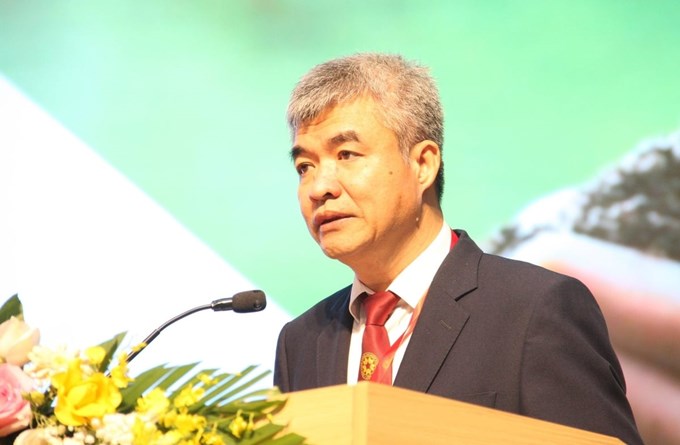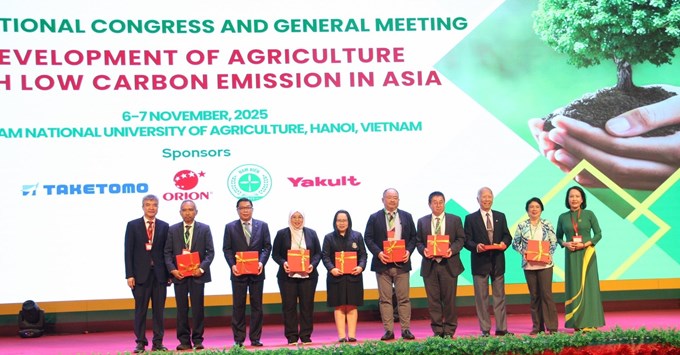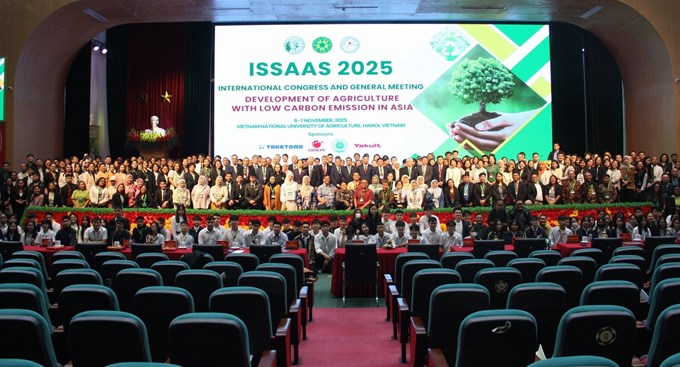The 2025 International Conference of the International Society for Southeast Asian Agricultural Sciences (ISSAAS) was held at Vietnam National University of Agriculture (VNUA), gathering leading scientists across Asia to deliberate on strategies for advancing green and low-carbon agricultural development.
On the morning of November 6, 2025, VNUA hosted the ISSAAS 2025 International Scientific Conference under the theme “Developing low-carbon agriculture in Asia.”

Prof. Dr. Pham Van Cuong, VNUA’s Vice President and President of the ISSAAS Vietnam Chapter, emphasizes that the conference serves as a forum to expand international cooperation in agricultural education, research, and technology transfer. Photo by Mai Dan.
Organized by the Vietnam Chapter of ISSAAS, the conference convened hundreds of scientists, policymakers, researchers, and students from Japan, Indonesia, Malaysia, the Philippines, Thailand, Vietnam, Cambodia, the Republic of Korea, and other countries.
According to Prof. Dr. Pham Van Cuong, Vice President of VNUA and President of the ISSAAS Vietnam Chapter, the conference provided a forum for expanding international collaboration in agricultural education, scientific research, and technology transfer. He emphasized that the chosen theme reflected the global momentum toward green, circular, and low-carbon agricultural transformation aimed at sustainable development and effective climate change adaptation.
“The conference is not only a venue for disseminating research findings but also an academic forum to foster international cooperation in agricultural education, research, and technology transfer,” Prof. Dr. Pham Van Cuong remarked.

The 2025 Outstanding Young Scientist Awards presented to exemplary researchers in the region. Photo by Mai Dan.
During the opening session, delegates reviewed the 2025 annual report of ISSAAS. Following that, the Matsuda Award 2025 was presented to Professor Tran Duc Vien, former President of the ISSAAS Vietnam Chapter, in recognition of his outstanding contributions to the association. The 2025 Outstanding Young Scientist Awards were also conferred upon exemplary researchers from across the region.
The 2025 Conference featured 200 scientific papers and more than 50 posters, covering a broad spectrum of disciplines, including crop science, genetics and plant breeding, plant protection, animal science and veterinary medicine, aquaculture, food technology, environmental science, agricultural engineering, agricultural economics and policy, agribusiness management, biotechnology, soil science, smart agriculture, and digital transformation.
Prof. Dr. Pham Van Cuong noted that the conference was a gathering of scholars who voluntarily engaged in academic exchange, sharing experiences and exploring new opportunities for professional collaboration. “Through these academic interactions, we can promote the image of Vietnam, its people and its agriculture, as a nation committed to green transformation and low-carbon agricultural development, thereby contributing to regional and global emission reduction goals,” he stated.

Participants of the ISSAAS 2025 International Conference at VNUA take a photo. Photo by Mai Dan.
Established in 1994, ISSAAS aimed to strengthen cooperative networks among agricultural scientists throughout Southeast Asia. The society’s core members included Indonesia, Japan, Malaysia, the Philippines, Thailand, and Vietnam, with Cambodia joining in 2023. The ISSAAS International Conference was held annually on a rotational basis among its member countries.
In 2024, ISSAAS celebrated its 30th anniversary at the Tokyo University of Agriculture (Japan) under the theme “ISSAAS in 2024 and Beyond: Agricultural Science for Sustainable Development in Southeast Asia.” At that event, the Vietnam Chapter received the rotating flag to host the 2025 ISSAAS Conference, signifying Vietnam’s growing prominence within the regional agricultural science community.
The ISSAAS 2025 Conference not only served as a platform for presenting the latest scientific findings but also marked a significant milestone affirming the academic standing of VNUA. The event contributed to the enhancement of regional cooperation in pursuit of green, sustainable, and low-carbon agricultural development.